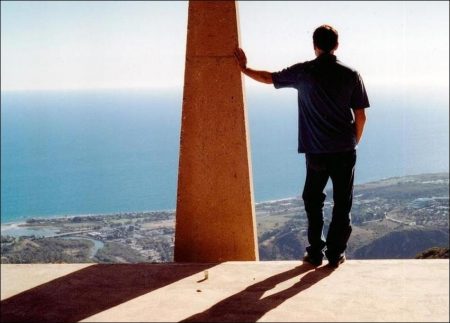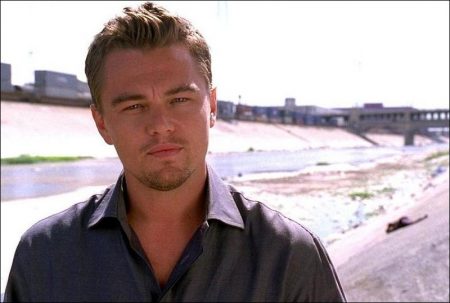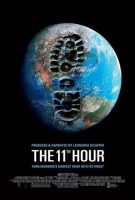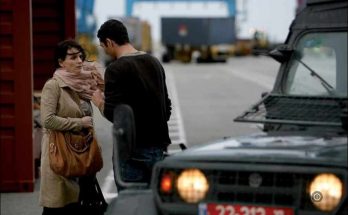Tagline: Turn mankind’s darkest hour into its finest.
The 11th Hour describes the last moment when change is possible. The film explores how humanity has arrived at this moment – how we live, how we impact the earth’s ecosystems, and what we can do to change our course.
The film features dialogues with experts from all over the world, including former Soviet Prime Minister Mikhail Gorbachev, renowned scientist Stephen Hawking, former head of the CIA R. James Woolsey and sustainable design experts William McDonough and Bruce Mau in addition to over 50 leading scientists, thinkers and leaders who present the facts and discuss the most important issues that face our planet.
Narrated by Leonardo DiCaprio, The 11th Hour is produced by Leonardo DiCaprio, Leila Conners Petersen, Chuck Castleberry and Brian Gerber, written and directed by Leila Conners Petersen and Nadia Conners.
Long Synopsis
Drought. Famine. Severe flooding. Record rainfall. Hurricanes. Acid rain. The highest average temperatures in recorded history. Catastrophe is reported on the nightly news as isolated incidents. But are these incidents isolated, or pieces of a larger global puzzle that could unlock humanity’s future?
In the history of the planet, humanity’s time on earth has been short but powerful. The human drive to ensure its own survival and quality of life has revolutionized industry, science, nutrition and medicine. But it has also effected unprecedented changes in the delicate balance that makes life on earth possible.
Shaped by oceans and rainforests that generate oxygen, absorb carbon dioxide, govern climate, weather and temperature, the planet earth is under siege. The alchemy of natural greenhouse gases that enables life has been augmented with chemicals from tail pipes and smoke stacks. For every truckload of product produced, many more truckloads of waste are created. The oceans have been flooded with mercury, heavy metals, and toxic chemicals. The forests are disappearing, deserts are widening, the arctic sea ice is melting, the permafrost has begun to crack. The earth has grown warmer. Not since a meteor hit the planet 55 million years ago have so many forms of life gone extinct.
But are these changes to the earth permanent? Or are they puzzle pieces that, if connected, reveal a larger story that needs to be told – a human story that takes into account who we are and the state of our relationship to this planet, our only home. We are in an environmental age whether we like it or not.
Narrated by Leonardo DiCaprio, produced by DiCaprio, Leila Conners Petersen, Chuck Castleberry and Brian Gerber, and written and directed by Leila Conners Petersen and Nadia Conners, The 11th Hour describes the last moment when change is possible.
The film explores how humanity has arrived at this moment – how we live, how we impact the earth’s ecosystems, and what we can do to change our course. The film features dialogues with experts from all over the world, including former Soviet Prime Minister Mikhail Gorbachev, renowned scientist Stephen Hawking, former head of the CIA R.
James Woolsey and sustainable design experts William McDonough and Bruce Mau in addition to over 50 leading scientists, thinkers and leaders who present the facts and discuss the most important issues that face our planet.
About the Film
After collaborating on two short films (Global Warning, Water Planet), filmmakers Nadia Conners, Leila Conners Petersen and Leonardo DiCaprio set out to explore the larger story of the human experience on the planet. Seeking out credible voices to speak to the history of the human species, the state of the oceans, land and air, and social, design and political challenges for change, the trio ultimately netted 150 hours of interviews with over 70 scientists, designers, historians and thinkers. “We reached out to independent experts on the front lines of what could be the greatest challenge of our time – the collapse of our planet’s ecosystems and our search for solutions to create a sustainable future,” says Leonardo DiCaprio.
“We ourselves wanted to understand why humans were on a crash course with nature, and what we had to do to change course,” says Co-Writer/Co-Director/Producer Leila Conners Petersen. Her sister and collaborator, Nadia Conners, adds, “One of the great things about doing this project was being able to meet people that inspired me or opened my mind through their work and writings. It was a great honor and a huge learning experience.”
The 11th Hour examines the human relationship with earth from its earliest glimmers of innovation to the challenges humanity faces in the present to the possibilities of the future. “It was the human mind that was the key to our very survival,”
David Suzuki, an award-winning scientist, environmentalist and broadcaster, says in the film. “Now, when you think that we evolved in Africa about a hundred and fifty thousand years ago, and compared to the other animals that must have been on the plains of that time, we weren’t very impressive. We weren’t very many; we weren’t very big; we weren’t gifted with special senses. The one thing, the key to our survival and our taking over the planet, was the human brain. But because the human mind invented the concept of a future, we’re the only animal on the planet that actually was able to recognize: we could affect the future by what we do today.”
The film posits that in many ways, humanity has detached itself from nature, and grown accustomed to using without thinking to manage the earth’s resources. “The big rupture came in the 1800s, with the steam engine, the fossil fuel age, the industrial revolution,” says Nathan Gardels, author, editor and Media Fellow of the World Economic Forum. “This was a great rupture from earlier forms and rhythms of life, which were generally regenerative. What happened after the industrial revolution was that nature was converted to a resource and that resource was seen as, essentially, eternally abundant. This led to the idea, and the conception behind progress which is: limitless growth, limitless expansion.”
“Finding coal here, and little bit of oil there, and between that and the agricultural revolution, slowly our population crept up until we hit our fist one billion people,” says Thom Hartmann, a best-selling author and progressive radio talk show host. “It didn’t take us a hundred thousand years to go from one billion to two billion. Our second billion only took us a hundred and thirty years. We hit two billion people in 1930. Our third billion took only 30 years, 1960. It’s amazing when you think about it. When John Kennedy was inaugurated, there were half as many people on the planet as there are today.”
“As we go forward, with technology even more powerful than before, we have magnified the presence of the human race inside the ecology, therefore we can do vastly more damage with our technological prowess than we could before,” says Nathan Gardels. “And we have to be even more cautious.”
After 200 years of industrial revolution, the atmosphere has undergone a pronounced shift. “The earth has a natural greenhouse effect,” explains Stephen H. Schneider, Professor and Senior Fellow at the Center for Environment Science and Policy of the Institute for International Studies. “In fact, we’re about 60 degrees Fahrenheit warmer, thanks to those good guys, water vapor and carbon dioxide and methane – what we call ‘greenhouse gases’ – trapping heat. That’s the good part of the story. The problem is that humans are competing with nature in that when we use our tail pipes and our smoke stacks to put our waste into the atmosphere as if it’s some kind of unpriced sewer, we’re adding – to that amount of greenhouse gases that is natural – unnatural stuff, mostly more carbon dioxide, methane, chemicals that nobody’s ever seen before, chlorofluorocarbons which also effect ozone. And when they build up, they trap extra heat.”
The shift of the planet’s temperature, it seems, is a red flag in relation to human existence. “It’s been enough to melt 20 percent of the sea ice in the arctic,” says author, journalist and environmentalist Bill McKibben. “It’s been enough to speed up the spin and duration of hurricanes about 50%. It’s been enough to start the permafrost beneath the tundra across the north melting.”
“One of the most serious consequences of our actions is global warming brought about by raising levels of carbon dioxide from the burning of fossil fuels,” explains Stephen Hawking, the revered Cambridge professor of Mathematics, theoretical physicist, and author. “The danger is that the temperature increase might become self-sustaining, if it has not done so already.
Drought and deforestation are reducing the amount of carbon dioxide recycled into the atmosphere and the warming of the seas may trigger the release of large quantities of CO2 trapped on the ocean floor. In addition, the melting of the Artic and Antarctic ice sheets will reduce the amount of solar energy reflected back into space and so increase the temperature further. We don’t know where the global warming will stop, but the worst case scenario is that earth would become like its sister planet, Venus, with a temperature of 250 centigrade, and raining sulfuric acid. The human race could not survive in those conditions.”
The earth, once covered in mostly green and blue, has also seen a decline in its life-giving rainforests as a direct result of industrial development. “Seventy countries in the world no longer have any intact or original forests,” comments Tzeporah Berman, Program Director for ForestEthics. “And here in the United States, ninety five percent of our old growth forests are already gone. Forest loss is also effecting climate change because forests are the greatest terrestrial storehouse of carbon. So, logging in Canada alone puts as much carbon into the atmosphere as all of the cars in California every year.”
Wangari Maathai, who won the 2004 Nobel Peace Prize for her work with the Green Belt Movement in Kenya, adds: “In my own part of the part of the world, I keep telling people, ‘Let us not cut trees irresponsibly. Let us not destroy especially the forested mountains. Because if you destroy the forests on these mountains, the rivers will stop flowing and the rains will become irregular and the crops will fail and you will die of hunger and starvation. Now the problem is, people don’t make those linkages.”
But with human ingenuity and optimism, there exists the potential to develop alternate systems that sustain, rather than degrade, the earth. “All of these forces sweeping over the planet are the forces created by human beings,” comments National Geographic Society explorer Wade Davis. “And if human beings are the source of the problem we can be the foundation for the solution.”
Adds social entrepreneur, author, journalist and filmmaker Kenny Ausubel, “With existing technologies that we basically already have on the shelf or things that we know we can develop in a very rapid period of time, we could literally reduce the human footprint on planet earth by 90 percent, which would be a huge shift to what we’re doing right now.”
What will guide this massive change? And does nature hold the answers to help restore the planet’s resources, protect our atmosphere and therefore, help all life survive? “I believe this could be like the civil rights movement 40 years ago,” says Nadia Conners. “We have to come together and show our leaders we want change while also showing each other that we are unified in saving the life support systems that we all depend on.”
As an intelligent life-form at the very top of the food chain, humanity nonetheless is susceptible to the same implacable threat faced by generations upon generations of other living organisms. “When we started the project, we wanted to take a ‘big picture’ look at how humans have related to the earth and take stock of the state of the planet,” says Leila Conners Petersen.
“It seems so obvious now but I was surprised to find out that humans are facing an extinction crisis along with all other life; that we are not excluded from catastrophic events; that, in fact, we are the most vulnerable even though we have technology. We learned that the earth is going to be fine. It’s us, human beings, that are in trouble.”
“We, as citizens, leaders, consumers and voters, have the opportunity to help integrate ecology into governmental policy and every day living standards,” concludes Leonardo DiCaprio. “During this critical period of human history, healing the damage of industrial civilization is the task of our generation. Our response depends on the conscious evolution of our species and this response could very well save this unique blue planet for future generations.”
The Cast of Experts
Ray Anderson, Founder, Interface, Inc.
Kenny Ausubel, Founder, Bioneers
Janine Benyus, Author, Biomimicry
Tzeporah Berman, Campaign Director & Founder, Forest Ethics
Lester Brown, President, Earth Policy Institute
Tim Carmichael, President, Coalition for Clean Air
Theo Colborn, President, The Endocrine Disruption Exchange
Herman Daly, Professor, University of Maryland, Former Senior Economist, World Bank
Wade Davis, Explorer-in-Residence, National Geographic Society
Peter deMenocal, Associate Professor, Lamont-Doherty Earth Observatory, Columbia University
Brock Dolman, WATER Institute Director, Occidental Arts & Ecology Center
Sylvia Earle, Oceanographer, Explorer-in-Residence, National Geographic Society
Rick Fedrizzi, President & CEO, US Green Building Council
Gloria Flora, Director, Sustainable Obtainable Solutions
Omar Freilla, Director, Green Worker Cooperatives
Nathan Gardels, Editor, New Perspectives Quarterly
Michel Gelobter, President, Redefining Progress
Leo Gerard, President, United Steel Workers International Union
Mikhail Gorbachev, Founding President, Green Cross International, 1990 Nobel Peace Prize Laureate
Thom Hartmann, Author, The Last Hours of Ancient Sunlight
Paul Hawken, Author, Environmentalist, Entrepreneur
Stephen Hawking, Lucasian Professor of Mathematics, Cambridge University
Richard Heinberg, Author, The Party¹s Over: Oil, War and the Fate of Industrial Societies
James Hillman, Psychologist
Jeremy Jackson, Oceanographer, Scripps Institute for Oceanography
Wes Jackson, President, The Land Institute
Tom Linzey, Executive Director, Community Environmental Legal Defense Fund
Andy Lipkis, President & Founder, Tree People
Oren Lyons, Faithkeeper, Turtle Clan, Onondaga Nation, Haudenosaunee, Six Nations, Iroquois Confederacy
Wangari Maathai, Founder, Greenbelt Movement, 2004 Nobel Peace Prize Laureate
Jerry Mander, Director, International Forum of Globalization
Bruce Mau, Creative Director, Bruce Mau Designs
William McDonough, Architect, William McDonough & Partners
Bill McKibben, Author, Founder, Stepitup07.org
Reverend James Parks Morton, Dean Emeritus, The Cathedral of St. John the Divine
Wallace J. Nichols, Senior Scientist, The Ocean Conservancy
David Orr, Chair, Environmental Studies Program, Oberlin College
Mathew Petersen, President & CEO, Global Green USA
Stuart Pimm, Professor of Conservation Ecology, Duke University
Sandra Postel, Director, Global Water Policy Project
Andy Revkin, Author & Science Reporter, New York Times
Stephen Schneider, Co-Director, Center for Environmental Science & Policy, Stanford University
Paolo Soleri, Architect, Founder of Arcosanti
Paul Stamets, Mycologist, Author, Mycelinium Running
David Suzuki, Scientist, Environmentalist, Broadcaster
Joseph Tainter, Author, The Collapse of Complex Societies
Betsy Taylor, Founder, Center for the New American Dream
John Todd, Ecological Designer
Vijay Vaitheeswaran, Energy & Environment Correspondent, The Economist
Peter Warshall, Founder, Whole Earth Catalogue
Sheila Watt-Cloutier, International Chair, Inuit Circumpolar Conference
Andy Weil, Director, Program for Integrative Medicine, University of Arizona
Diane Wilson, Author, An Unreasonable Woman
James Woolsey, VP, Booz Allen Hamilton, Director, CIA, 1993-1995
The 11th Hour (2007)
Directed by: Leila Conners Petersen, Nadia Conners
Starring: Leonardo DiCaprio (narrator)
Screenplay by: Leila C. Petersen, Nadia Conners, Leonardo DiCaprio
Cinematography by: Peter Youngblood Hills
Film Editing by: Luis Alvarez y Alvarez, Pietro Scalia
Music by: Jean-Pascal Beintus
MPAA Rating: PG for some mild disturbing images and thematic elements.
Distributed by: Warner Independent
Release Date: August 17, 2007
Views: 78






